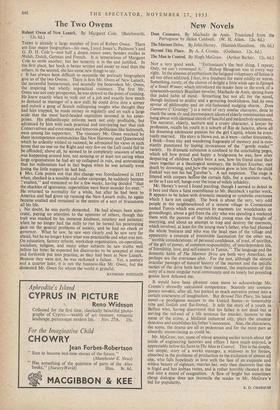New Novels
Dom Casmurro. By Machado de Assis. Translated from the Portuguese by Helen Caldwell. (W. H. Allen. 12s. 6d.) The Man in Control. By Hugh McGraw. (Arthur Barker. 12s. 6d.) NOT a very good week. "Enthusiasm's the best thing, I repeat; Only, we can't command it." Bishop Blougram was in every way right. In the absence of enthusiasm the fatigued voluptuary of fiction is all too often addicted, I fear, to a fondness for mere oddity or worse. Something, surely, of the chorus of delight a little while ago in Epitaph of a Small Winner, which introduced the reader here to the work of a nineteenth-century Brazilian novelist, Machado de Assis, sprang from this jaded habit of mind. Something but not all; for the novel; though inclined to aridity and a gesturing bookishness, had its own savour of philosophy and an old-fashioned nudging charm. Dom Casmurro ("Grumpy") is a novel of very similar character, done in much the same sly and inconsequent idiom of elderly reminiscence and hung about with identical shreds of fanciful and melancholy sentiment. The narrator, elderly, taciturn and a crusty character, a lawyer by profession, recalls his youth in a suburb of Rio de Janeiro, above all • his dreaming adolescent passion for the girl Capita, whom he even- tually married. His story is blown out, as it were—rather tiresomely, I think—from tiny and wandering fragments of memory and is con- stantly punctured by lisping invocations of the "gentle reader" variety. Its dramatic substance is confined to the concluding pages, which tell how proud and happy a bridgroom he was, how after despairing of children Capita bore a son, how his friend since their years together at a theological seminary, the brilliant Escobar, met death by drowning, andjiow the suspicion grew in him that the child Ezekiel was not his but A sad suspicion. The stage is littered with corpses befgre• the curtain falls, but a question mark, . so far as I can tell, hangs over the issue of wifely infidelity.
Mr. Hersey's novel I found puzzling, though I seemed to detect in it here and there a faint resemblance to Mr. Steinbeck's earlier work. It appears to be laden with dramatic meaning or symbolic overtones which I have not caught. The book is about the very, very odd people in the neighbourhood of a remote village in Connecticut named Tunxis which was overrun by marmots (or woodchucks or groundhogs), about a girl from the city who was spending a weekend there with the parents of the inhibited young man she thought of marrying, and about an attempt to trap and destroy the marmots, which involved, at least for the young man's father, who had planned the whole business and who was the head man of the village and apparently a creature of irresistible fascination for the other sex, "terrible considerations: of personal confidence, of trust, of sacrifice, of the gift of power, of common responsibility, of interdependent life, of friendship, love, and self-esteem in Tunxis." The language and the domestic habit of The Marmot Drive are both very Amerrcan, as perhaps are the overtones also. For the rest, although the almost oracular passages of natural history of the marmot and the specific tactics of the drive both have their interest, the implications of this story of a most singular rural community and its lonely but presiding genius have defeated me.
It would have been pleasant once more to acknowledge Mr. Cronin's shrewdly calculated competence. Scarcely any contem- porary novelist, after all, 'has packed as much narrative power into a certain coarseness of imagination. But Beyond This Place, his latest novel—a prodigious success in the United States—is lamentably trite and foolish and fiat-footed. It tells the story of a youth in Belfast who, having discovered that his father is not dead but is serving the tail-end of a life sentence for murder, hastens to the scene of the crime, a Midland industrial city, plays the amateur detective and establishes his father's innocence. Alas, .the characters, the scene, the drama are all as pedestrian and for the most part as absurdly unconvincing as could be.
Mr. McGraw, too, some of whose amusing earlier novels about the inside of engineering factories and offices I have much enjoyed, is appreciably below his form in The Man in Control. This is the simple, too simple, story of a works manager, a widower in his forties, absorbed in the problems of production to the exclusion of almost all else, who falls hopelessly in love with the face of an exquisite and Witless beauty of eighteen, marries her, only then discovers that she is frigid and has lesbian tastes, and is rather horribly cheated in the end into a mood of resignation. A flow of bright but sometimes cheap dialogue does not reconcile the reader to Mr. McGraw's bid for popularity.
R. D. CHARQUES
































 Previous page
Previous page